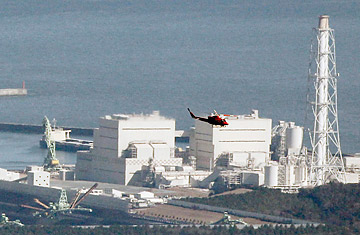
A helicopter flies past Japan's Fukushima Daiichi No.1 Nuclear reactor March 12, 2011.
Updated: March 13, 2011 10:45 p.m.
A day after Japan was hit by a double blow — a monster earthquake followed by a killer tsunami — the full extent of death and destruction is still unclear. By 8 a.m. Tokyo time on Sunday, the official toll was 686 people dead, 1,128 injured and 784 missing, but those figures are expected to rise dramatically in coming days. One town, Minamisanriku, had about 10,000 people unaccounted for. Meanwhile, a crippled nuclear reactor was being flooded with sea water mixed with boron, an emergency replacement for regular coolant. One concerned U.S. expert called the effort "a Hail Mary pass."
The sea water appears to have been brought in as a substitute for the regular water used as coolant for the uranium fuel rods at the heart of the reactor. The combination of earthquake and tsunami appears to have knocked out both the on-site electrical generators and off-site ones used to pump in the water — hence the move to flood the reactor with sea water, which is in plentiful supply from the relatively close-by coast. The failure of both generators is technically called a "station blackout" scenario, says physicist Ken Bergeron at a teleconference of nuclear safety experts in Washington D.C. The scenario, he says, was low probability and highly unlikely. The reported presence of Cesium 127 was disturbing, experts agreed, because it was evidence that the core had overheated, if only for a portion of time. The radioactive debris is produced when the core is exposed above the coolant water level and overheats. One of the other potential by-products of such overheating is hydrogen. Hydrogen is believed to be the cause of the blast at Fukushima.
How bad might it get? According to Bergeron, the physicist, if the core does melt, you could have containment failure in less than a day, exposing the core to the external environment. In this scenario, the only thing that could be done would be to entomb the melted core in sand and cement, much as was done in Chernobyl. Said Bergeron, "A lot of first responders will die." Chernobyl rendered an area half-the-size of New Jersey uninhabitable.
Meanwhile, much of northeastern Japan, which was hardest-hit, is still under water, and entire neighborhoods have been buried by mud and debris. Damage in the biggest city in the region, Sendai, which has a population of about 1 million, has yet to be properly assessed. Four trains plying coastal routes have disappeared. Search and rescue efforts have been hampered by collapsed and blocked highways and roads. Food and water are scarce, and countless numbers of people are stranded and without heat and power. Tokyo's airports are still closed. On-the-ground reports from the badly affected areas are few and incomplete.
U.S. President Barack Obama called the quake a 'potentially catastrophic disaster' and pledged military and other assistance. U.S. military units based in Japan offered to participate in rescue operations and other humanitarian missions should the Japanese government ask for help. The U.S. Navy's Seventh Fleet is based near Tokyo. Some 50 other nations said they were standing by to help if needed.
It will take time for Japan to weigh the full economic implications of the disaster. Earthquakes tend to have less impact on major economies than first expected. The areas badly hit on Friday are less economically important than the coastal industrial zones that suffered greatly after the 1995 Kobe earthquake. But the disaster could create even more uncertainty about Japan's recovery from its worst postwar recession. Says Richard Jerram, chief Asia economist of the Macquarie Group: "The fragile economic cycle is not in a position to withstand significant disruption."
Koichi and Yukiko Fujii, an elderly couple now living in Tokyo, were residents of Kobe when the quake hit there. "Kobe was terrifying but this one in Tokyo was a lot worse," says Yukiko. Koichi turned 85 on Friday. "This is quite a birthday present ... I have lived through World War II, and two of the worst earthquakes in Japan's history. I sure hope this is it for a while." Sadly, for Japan and its people, the suffering is far from over.
With reporting by Howard Chua-Eoan/New York
